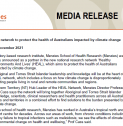Dr Supriya Mathew
Senior Research Fellow
Qualifications:
PhD Environment and Geography, Macquarie University, 2013; MTech Ocean Technology, Cochin University of Science and Technology, 2007; MSc Physics, Mahatma Gandhi University, 2002;
Approved level of HDR supervision at Charles Darwin University:
Co-supervise
Location:
Alice Springs Office, Northern Territory
Biography:
Supriya Mathew is a multi-disciplinary researcher, specialising in mixed methods research. She started with Menzies in August 2019 and has been working on projects related to rural and remote health services research and environmental health research.
Supriya is currently leading and overseeing the Menzies climate change research programs, exploring the impacts of heat on health in Northern and central Australia and devising innovative ways to reduce the impacts.
Prior to joining Menzies, Supriya’s research focussed on addressing the research gap between climate sciences and adaptation decision-making. Her doctoral research focused on climate adaptation decision-making frameworks for local governments in India and Australia. Her doctoral research work is available in the form of a MS Excel based decision-making tool which is used by local governments’ nationally and internationally to prioritise adaptation options for extreme weather events.
Research Themes
- Indigenous health
-
Examining the impact of extreme temperature on primary health service utilisation in remote Central Australia to inform adaptation strategies
-
Aboriginal prosperity through community driven translational research
-
Healthy Environments and Lives Network (HEAL Network)
-
Air in Alice: a community response to reduce future environmental risks
-
Clean Energy for Healthy Environments and Lives (CE4HEAL)
-
Healing Country: integrating knowledge systems to meet climate challenges
-

HEAL network to tackle health impacts of climate change
Charles Darwin University and Menzies researchers are part of the 100 researchers in the new HEAL network, which aims to protect the health of Australians impacted by climate change
-
New network to protect the health of Australians impacted by climate change
Menzies was today announced as a partner in the new national research network ‘Healthy Environments And Lives’ (HEAL), which aims to protect the health of Australians impacted by climate change.
-
$10 million national network to build resilience to the human health impacts of environmental change
The National Health and Medical Research Council (NHMRC) welcomes today’s announcement by Minister for Health Greg Hunt of the $10 million Special Initiative in Human Health and Environmental Change.
-
Citizen Scientists to help in important national research projects
$499,323 for the Menzies School of Health Research to run its “Air in Alice” program.
- Mathew S, Mathur D, McDonald E, Chang AB, Gerritsen R (2019) Midwife observations on the impact of hot weather on poor perinatal outcomes in central Australia: a qualitative study, Learning Communities: International Journal of Learning in Social Contexts, 24, 98-112. DOI: https://doi.org/10.18793/lcj2019.24.07 •
- Mathew S, Zeng B, Zander KK, Singh RK (2018), Exploring agricultural development and climate adaptation in northern Australia under climatic risks, The Rangeland Journal, https://doi.org/10.1071/RJ18011
- Truong C, Trueck S and Mathew S (2018) Managing Risks from Climate Impacted Hazards - The Value of Investment Flexibility under Uncertainty, European Journal of Operational Research, https://doi.org/10.1016/j.ejor.2017.07.012
- Zander KK, Mathew S, Garnett S (2018), Exploring Heat Stress Relief Measures among the Australian Labour Force, International Journal of Environmental Research and Public Health, Vol. 15, Pages 401 • Mathew S, Mathur D, Chang A.B, McDonald E, Singh GR, Nur D, Gerritsen R (2017) Examining the effects of ambient temperature on pre-term birth in central Australia, International Journal of Environmental Research and Public Health, 14(2), 147; doi:10.3390/ijerph14020147
- Mathew S., Trueck S. and Henderson-Sellers A. (2012) Kochi, India case study of climate adaptation to floods: ranking local government investment options, Global Environmental Change 22(1), 308-319 • Race D., Dockery M., Havas L., Matthews C., Mathew S and Spandonide B. (2016). Re-imagining the future of desert Australia: Designing an integrated pathway for enhancing livability, International Journal of Sustainable Development, Available online at http://www.inderscience.com/info/ingeneral/forthcoming.php?jcode=ijsd.
- Race D., Mathew S., Campbell M., & Hampton K. (2016). Understanding climate adaptation investments for communities living in desert Australia: Experiences of indigenous communities. Climatic Change DOI: 10.1007/s10584-016-1800-4
- Mathew S., Lee L.S., & Race D. (2016). Conceptualising climate change adaption for native bush food production in arid Australia. Learning Communities: International Journal of Learning in Social Contexts [Special Issue: Synthesis & Integration], 19, 98-115. doi: 10.18793/LCJ2016.19.07.
- Race D., Mathew S., Campbell M., & Hampton K. (2016). Are Australian Aboriginal communities sustainably adapting to warmer climates? A study of communities living in semi-arid Australia. Journal of Sustainable Development, 9(3), 208-223. doi: 10.5539/jsd.v9n3p208.
Full list at https://www.researchgate.net/profile/Supriya_Mathew2

.jpg&w=214&h=285)


